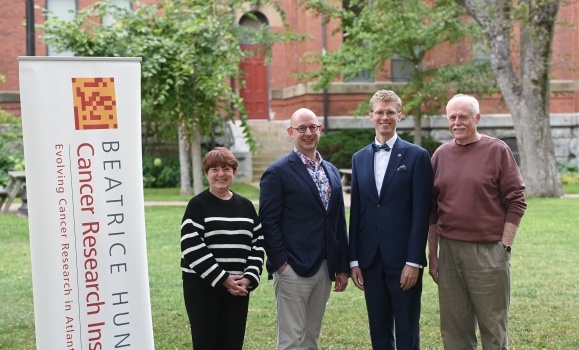Two in five Canadians will be diagnosed with cancer over their lifetime. Â
Receiving a cancer diagnosis can be overwhelming, and amidst the shock and uncertainty, it’s understandable that exercise may not be top of mind. The field of exercise oncology, however, has been growing rapidly, showing benefits including reduced disease and treatment-related side effects like depression, anxiety, muscle weakness and cancer-related pain, as well as a reduced risk of disease recurrence and cancer mortality. Â
The important role of exercise in cancer treatment has been the focus of Dr. Stefan Heinze’s research. The 2024 Beatrice Hunter Cancer Research Institute’s (BHCRI) Jen Johnston Prize for Research Excellence recipient, following his MSc and PhD at Dalhousie, Dr. Heinze completed a CIHR Postdoctoral Health System Impact Fellowship, embedding the academic training of researchers within Nova Scotia’s healthcare systems to facilitate positive change. His position was split between Nova Scotia Health’s Cancer Care Program and şÚÁĎłÔąĎÍř’s Physical Activity and Cancer (PAC) Lab, supervised by Dr. Helmut Hollenhorst and Dr. Scott Grandy. Â
Exercise strategy for survivors
Dr. Heinze is recognized for the work completed during his fellowship which focused on exercise oncology and its implementation into a standard of care in Nova Scotia. Now published, his effectiveness-implementation trial, called Activating Cancer Communities through an Exercise Strategy for Survivors (ACCESS), is used to provide exercise programing and strategies, while investigating barriers for those living with or beyond cancer. It involved a 12-week supervised exercise program, designed to fit each participant’s health and fitness needs. Individuals would exercise either in the PAC Lab, located in the QEII Health Sciences Centre, with a community partner site, or through virtual care. Â
“We found that the ACCESS program was effective at improving not only physical fitness but also very importantly, it helped reduce cancer-related fatigue, improve overall wellbeing and sleep, as well as reducing negative emotional states,” says Dr. Heinze. “I designed an action framework describing the provision of exercise oncology which was endorsed by the senior leadership council of the Cancer Care program, a crucial step in the implementation process.”
With no exercise oncology program embedded within supportive cancer care in Nova Scotia, this was a crucial step to advance the health system and provide valuable exercise oncology services that make meaningful differences.
As a person who has experienced a loved one being affected by cancer, Dr. Heinze has seen firsthand the positive impacts that engaging with physical activity and exercise can have on one’s cancer journey. Â
“It was inspiring to me and reflected a broader message that exercise oncology gives agency to people with a disease that can be all-consuming. The social connections and positive emotions that come from participating in exercise oncology are important on so many levels of health and wellbeing.”
An aspiring clinician Â
Dr. Heinze’s postdoctoral fellowship with Dr. Grandy provided synergy to work between academic and clinical science settings, allowing for its application and implementation into cancer care protocols. Â
“This was a way for me to help make a difference for people like my father, helping individuals that need support to engage with physical activity and exercise, who may not have that opportunity otherwise.” Â
After completing his fellowship, Dr. Heinze was accepted to şÚÁĎłÔąĎÍř’s Medical School, where he is currently a first-year medical student. Â
“I aspire to be a clinician scientist, and help people maintain or regain independence after being affected by chronic diseases like cancer,” he says. “Becoming a physician is an important step for me to help give back to society, using my passion for health to make a positive impact.” Â
Dr. Heinze has maintained his connection to exercise oncology through volunteering with PAC Lab. The framework he created has been applauded and endorsed by the provincial Cancer Care Council as a roadmap to move exercise oncology into cancer care operations in a systematic and sustainable way.  Â
Dr. Heinze has immense gratitude to the BHCRI for their support throughout his postdoctoral fellowship. Â
“It was a delight to be involved with the Cancer Research Training Program, providing me with the opportunity to expand my knowledge of cancer research while helping give back to the cancer research community by acting as a mentor,” he says. “It is an incredible honour to receive the 2024 Jen Johnston Award, as it allows me to share the story of the ACCESS program while channeling the values Jen embodied and push for improvements in how our health system can better support people affected by cancer.” Â
The Beatrice Hunter Cancer Research Institute’s Jen Johnston Prize for Research Excellence is awarded annually to acknowledge a recently published paper with a past or present CRTP trainee serving as a sole or co-first author. It was established in 2022 from memorial donations honouring Jen Johnston, the daughter of BHCRI’s former scientific director Dr. Gerry Johnston, who unfortunately lost her life to advanced-stage breast cancer in 2021. Â

